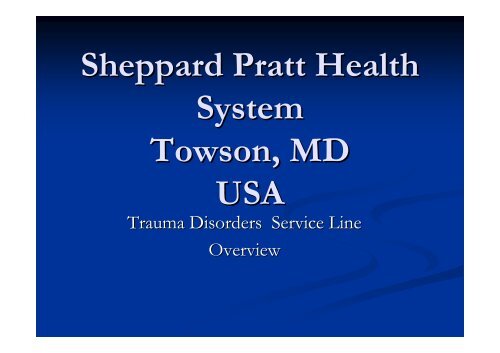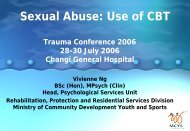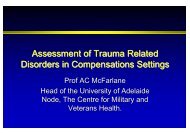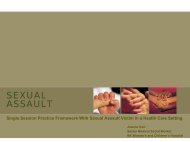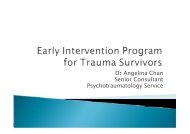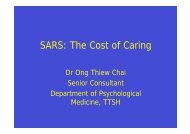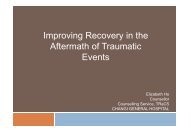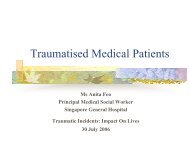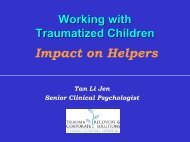Acute Trauma Service Setup In Sheppard Pratt
Acute Trauma Service Setup In Sheppard Pratt
Acute Trauma Service Setup In Sheppard Pratt
You also want an ePaper? Increase the reach of your titles
YUMPU automatically turns print PDFs into web optimized ePapers that Google loves.
<strong>Sheppard</strong> <strong>Pratt</strong> Health<br />
System<br />
Towson, MD<br />
USA<br />
<strong>Trauma</strong> Disorders <strong>Service</strong> Line<br />
Overview
Mission<br />
• To provide tertiary care for the most disabled<br />
and treatment-refractory refractory patients with trauma-<br />
related psychiatric illnesses in the U.S. (and<br />
Canada).<br />
• To provide training to psychology post-doctoral<br />
fellows, as well as students in nursing,<br />
occupational therapy, art therapy and social<br />
work programs.
Program Structure<br />
• Continuum of Care <strong>In</strong>cluding:<br />
• <strong>In</strong>patient 20 bed unit<br />
• Partial Hospital Program (IOP)<br />
• Outpatient Program<br />
• <strong>Acute</strong> trauma <strong>Service</strong>s<br />
• Training<br />
• Supervision / Consultation (internal and external)<br />
• Research
Program Structure<br />
• <strong>Service</strong> Line Director: Psychiatrist<br />
• Unit Chief: Psychiatrist<br />
• Unit manager: Psychiatric RN<br />
• Training Director: Psychologist<br />
• Consultation <strong>Service</strong> Director: Psychologist
<strong>In</strong>patient <strong>Trauma</strong> Disorders Unit<br />
• 20 bed Secure, co-ed Unit<br />
• <strong>In</strong>dividual rooms<br />
• Voluntary Admission<br />
• Referral by treating clinician with agreement to<br />
accept the patient upon discharge<br />
• Variable length of stay (21 day avg.)
Multidisciplinary Team Approach<br />
• Psychiatrist<br />
• Psychologist<br />
• Social Worker<br />
• Occupational therapist<br />
• Psychiatric Nurses with trauma training<br />
• Nursing staff with trauma training<br />
• Art therapist<br />
• Director of Pharmacy
Vision<br />
• To be a specialized inpatient program providing<br />
state-of<br />
of-the-art treatment in all treatment<br />
modalities to patients with complex post-<br />
traumatic stress disorders and dissociative<br />
disorders.<br />
• To be recognized as a national center of<br />
excellence in providing treatment to these<br />
patients.
Reasons for Admission<br />
• Safety / Crisis Stabilization<br />
• Dissociative Disorder impairing functioning<br />
• PTSD<br />
• <strong>Acute</strong><br />
• Complex
Other Primary Diagnoses<br />
• Anxiety/Mood Disorders<br />
• Personality Disorders<br />
• Eating Disorders<br />
• Substance Abuse Disorders<br />
• Somatoform Disorders<br />
• Psychotic Disorders
Treatment Philosophy<br />
• Patients are held responsible for their behavior and<br />
their treatment despite their current suffering and their<br />
histories of trauma and victimization.<br />
• An emphasis on restoration of independent functioning<br />
through the development of the patient’s s own<br />
capabilities to manage symptoms and life stressors in a<br />
progressive, adaptive and self-generated fashion.
Treatment Philosophy (con(<br />
con’t)<br />
• Safety is a Primary Goal<br />
• <strong>In</strong>cludes:<br />
• Refraining from acting on impulses to harm self<br />
and/or others<br />
• Control of addictive, self-defeating, and risk taking<br />
behaviors<br />
• Avoid re-victimization<br />
• Development of supportive relationships<br />
• Ability to tolerate intense affective states
Treatment Philosophy (con(<br />
con’t)<br />
• Dedicated to the spirit of intellectual inquiry and<br />
openness, as well as to rigorous differential<br />
diagnosis of our patients.
Pre Admission Screening<br />
• Referring clinician provides:<br />
• Goals for admission<br />
• History<br />
• Diagnostic Issues<br />
• Medication History<br />
• Review of legal issues<br />
• Agreement to accept Pt. upon discharge<br />
• Medical History
Course of Treatment<br />
• Assessment-<br />
Diagnostic<br />
Psychosocial<br />
Somatic<br />
Pharmacological<br />
Coping Skills<br />
Discharge Planning
Course of Treatment (con(<br />
con’t)<br />
• Treatment-<br />
Therapy: A shift from external to internalized<br />
management of symptoms, with a focus<br />
on increasing awareness of precipitants<br />
of self-harm, by resolving internal<br />
conflicts or regulating intense affective<br />
states driving dangerousness.
Treatment Structure<br />
• Daily Attending Rounds<br />
• <strong>In</strong>dividual Psychotherapy- 3x/wk for 45 min<br />
• Group Treatment Modalities<br />
• Milieu Therapy
TIME SUNDAY MONDAY TUESDAY WEDNESDAY THURSDAY FRIDAY SATURDAY<br />
9 am Cognitive Task<br />
Skills A<br />
Cognitive Task<br />
Skills B<br />
Cognitive Task<br />
Skills A<br />
Ask Anything<br />
A&B<br />
Cognitive Task<br />
Skills B<br />
10 am Goals<br />
A&B<br />
Goals<br />
A&B<br />
Goals<br />
A&B<br />
Goals<br />
A&B<br />
Goals<br />
A&B<br />
Goals<br />
A&B<br />
Goals<br />
A&B<br />
11 am<br />
Journal<br />
Group<br />
A & B<br />
Art Therapy B<br />
11:00 - 12:15<br />
Containment II A<br />
Containment A&B<br />
Creative Expression<br />
A&B<br />
Transitions B<br />
(11:00-11:45)<br />
Art Therapy A<br />
(11:00-12:15)<br />
Containment II B<br />
Journal<br />
Group<br />
A&B<br />
1 pm Health &<br />
Stress<br />
Management<br />
A & B<br />
Cognitive<br />
Therapy A<br />
Containment II B<br />
Art Therapy A<br />
(12:45-2:00)<br />
CognitiveTherapy B<br />
Transitions A<br />
(1:00-1:45)<br />
Applied Containment<br />
(1:00-1:45)(R)<br />
Containment A&B<br />
Art Therapy B<br />
((12:45 -- 2:00)<br />
Containment II A<br />
Health &<br />
Stress<br />
Management<br />
A&B<br />
2 pm<br />
DBT Skills<br />
Family Issues ( R)<br />
2:00-2:45<br />
Tension<br />
Reduction(R)<br />
DBT Skills<br />
3 pm<br />
Medication<br />
Education<br />
(A&B)<br />
4 pm<br />
Newcomers Newcomers Collage (A&B)<br />
Journal Group A&B<br />
Journal Making (R)<br />
Health & Stress<br />
Management<br />
Symptom<br />
Management<br />
A & B<br />
7 pm<br />
Small groups<br />
(7:15)<br />
Small groups<br />
(7:15)<br />
Small groups<br />
( 7:15)<br />
Small groups<br />
( 7:15)<br />
Small groups<br />
( 7:15)<br />
Small groups<br />
( 7:15)<br />
Small<br />
groups<br />
( 7:15)<br />
8 pm Community<br />
Meeting<br />
A&B<br />
Community<br />
Meeting<br />
A&B<br />
Community<br />
Meeting<br />
A&B<br />
Community Meeting<br />
A&B<br />
Community Meeting<br />
A&B<br />
Community<br />
Meeting<br />
A&B<br />
Community<br />
Meeting<br />
A&B
<strong>In</strong>tensive Outpatient Program<br />
• 9am -3pm , 5 days / week<br />
• Capacity of 15-24<br />
Pt.s<br />
• Milieu Based therapeutic model<br />
• Assessment Phase includes a multidisciplinary<br />
evaluation<br />
• Diagnostic clarification<br />
• <strong>In</strong>dividual Psychotherapy NOT provided
Outpatient <strong>Service</strong>s<br />
• Outpatient Program<br />
• <strong>In</strong>dividual Psychotherapy<br />
• Psychiatric <strong>Service</strong>s<br />
• Family / Couples therapy<br />
• Children and Adolescent <strong>Service</strong>s<br />
• Group Psychotherapy<br />
• Psychological Testing <strong>Service</strong>s<br />
• Forensic <strong>Service</strong>s<br />
• Education / Training/ Supervision
<strong>Acute</strong> <strong>Trauma</strong> <strong>Service</strong>s<br />
• Began July 2002<br />
• Outpatient Program( with ability to admit and<br />
treat on inpatient unit when indicated)<br />
• Designed to address needs of acutely<br />
traumatized and to provide Preventative<br />
<strong>Service</strong>s for at risk populations<br />
• <strong>In</strong>dividual and Group Psychotherapy<br />
• CISM services (internal and external)
<strong>Acute</strong> <strong>Trauma</strong> <strong>Service</strong>s<br />
• Resilience Focused<br />
• Crisis / Early <strong>In</strong>tervention <strong>Service</strong>s<br />
• Advocacy Work (crime victims, military,<br />
occupational injury patients)
<strong>Acute</strong> trauma <strong>Service</strong>s<br />
• Supervision<br />
• Consultation<br />
• Workers Compensation <strong>Service</strong>s<br />
• Disaster Drill Management and Evaluation
<strong>Acute</strong> <strong>Trauma</strong> <strong>Service</strong>s<br />
• Training was a major component<br />
• HRSA Bioterrorism Funding Secured for 2 years<br />
(2004-2005)<br />
2005)<br />
• Conducted 36 workshops (full day) for area medical<br />
facilities, and schools to prepare personnel to<br />
manage the psychological impact of disasters and<br />
terrorism<br />
• Multiple other acute trauma workshops
Lessons Learned<br />
• You must balance the services that clinicians<br />
provide to prevent loss of staff due to burnout /<br />
secondary traumatization<br />
• The impact of this type of service delivery on<br />
staff is much different that other types of<br />
Psychiatric care<br />
• Staff care and peer support are essential<br />
components
Lessons Learned<br />
• Research, Consultation, and Training are<br />
balancing factors<br />
• Limiting <strong>Trauma</strong> Caseload<br />
• A specialty center was greatly needed for the<br />
complex trauma patients<br />
• General psychiatric units were very willing to refer<br />
and transfer for specialty care<br />
• Pt.s often commented on the differences in care they<br />
received


